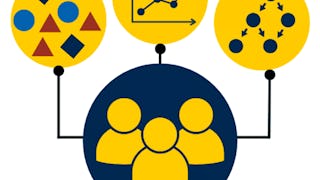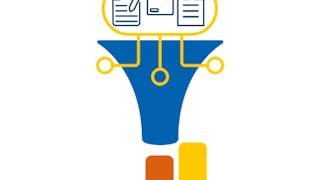In “Applied Unsupervised Learning in Python,” you will learn how to use algorithms to find interesting structure in datasets. You will practice applying, interpreting, and refining unsupervised machine learning models to solve a diverse set of problems on real-world datasets.

Vente anticipée ! Débloquez plus de 10 000 cours de Google, Microsoft et autres pour 160 €/an. Économisez maintenant.


Applied Unsupervised Learning in Python
Ce cours fait partie de Spécialisation More Applied Data Science with Python

Instructeur : Kevyn Collins-Thompson
Inclus avec 
Expérience recommandée
Ce que vous apprendrez
Apply unsupervised learning methods, such as dimensionality reduction, manifold learning, and density estimation, to transform and visualize data.
Understand, evaluate, optimize, and correctly apply clustering algorithms using hierarchical, partitioning, and density-based methods.
Use topic modeling to find important themes in text data and use word embeddings to analyze patterns in text data.
Manage missing data using supervised and unsupervised imputation methods, and use semi-supervised learning to work with partially-labeled datasets.
Compétences que vous acquerrez
- Catégorie : Dimensionality Reduction
- Catégorie : Machine Learning Algorithms
- Catégorie : Data Science
- Catégorie : Unsupervised Learning
- Catégorie : Text Mining
- Catégorie : Feature Engineering
- Catégorie : Supervised Learning
- Catégorie : Natural Language Processing
- Catégorie : Data Manipulation
- Catégorie : Statistical Machine Learning
- Catégorie : Machine Learning
- Catégorie : Anomaly Detection
Détails à connaître

Ajouter à votre profil LinkedIn
juin 2025
21 devoirs
Découvrez comment les employés des entreprises prestigieuses maîtrisent des compétences recherchées

Élaborez votre expertise du sujet
- Apprenez de nouveaux concepts auprès d'experts du secteur
- Acquérez une compréhension de base d'un sujet ou d'un outil
- Développez des compétences professionnelles avec des projets pratiques
- Obtenez un certificat professionnel partageable

Il y a 4 modules dans ce cours
Welcome to Module 1! In this module, we will learn the basic unsupervised learning methods that focus on transformation of data: dimensionality reduction, manifold learning, and density estimation. We will be using realistic datasets for our analyses, implemented using the scikit-learn library. At the end of this Module, our assignment is to apply Principal Components Analysis to gain insight into a large real-world dataset. We will use manifold learning methods such as t-SNE to visualize complex structure, and use kernel density estimation to estimate probabilities of conditional events. Let’s begin!
Inclus
18 vidéos7 lectures7 devoirs1 devoir de programmation1 sujet de discussion1 plugin
Welcome to Module 2! In this module’s module, we will learn about clustering—another critical and widely-used unsupervised learning method. We will learn about the most important families of clustering algorithms, such as hierarchical methods (agglomerative bottom-up, divisive top-down), partitioning methods (k-means, k-medoids) and density-based methods (DBSCAN). We will also gain awareness of how to evaluate and optimize cluster quality. At the end of this module, our assignment is to apply a variety of these clustering approaches to realistic datasets using SciKit-Learn's clustering capabilities. Let’s begin!
Inclus
10 vidéos3 lectures5 devoirs1 devoir de programmation1 plugin
Welcome to Module 3! In this module’s module, we will learn about estimating latent variables—another important area of unsupervised learning, especially for text-based applications. We will focus first on the topic of text representations. Topic modeling is another form of latent variable estimation, which we will learn about via two different methods: Latent Dirichlet Allocation (LDA) and Non-Negative Matrix Factorization. We will also survey word embeddings to learn how to represent words with vectors in semantically useful ways. At the end of this module, our assignment is to solve problems through analyzing topic structure in a large document collection, and applying word embeddings to an NLP-related task. Let’s begin!
Inclus
8 vidéos2 lectures5 devoirs1 devoir de programmation1 plugin
Welcome to Module 4, our last module of the course! We wrap up our course by learning about how unsupervised methods can be integrated with supervised learning methods to improve prediction performance. A key topic this module in that direction covers imputation methods for dealing with missing data. We will also look at various special topics, including extensions of unsupervised learning that are used at the cutting edge of today's technology: semi-supervised learning and self-supervised learning. At the end of this module, our assignment is to apply methods and techniques for imputing missing data and semi-supervised learning, with the underlying theme being how unsupervised learning can improve supervised learning. Let’s begin!
Inclus
7 vidéos3 lectures4 devoirs1 devoir de programmation1 plugin
Obtenez un certificat professionnel
Ajoutez ce titre à votre profil LinkedIn, à votre curriculum vitae ou à votre CV. Partagez-le sur les médias sociaux et dans votre évaluation des performances.
Instructeur

Offert par
En savoir plus sur Machine Learning

University of Michigan

University of Michigan

University of Michigan
Pour quelles raisons les étudiants sur Coursera nous choisissent-ils pour leur carrière ?





Ouvrez de nouvelles portes avec Coursera Plus
Accès illimité à 10,000+ cours de niveau international, projets pratiques et programmes de certification prêts à l'emploi - tous inclus dans votre abonnement.
Faites progresser votre carrière avec un diplôme en ligne
Obtenez un diplôme auprès d’universités de renommée mondiale - 100 % en ligne
Rejoignez plus de 3 400 entreprises mondiales qui ont choisi Coursera pour les affaires
Améliorez les compétences de vos employés pour exceller dans l’économie numérique
Foire Aux Questions
Access to lectures and assignments depends on your type of enrollment. If you take a course in audit mode, you will be able to see most course materials for free. To access graded assignments and to earn a Certificate, you will need to purchase the Certificate experience, during or after your audit. If you don't see the audit option:
The course may not offer an audit option. You can try a Free Trial instead, or apply for Financial Aid.
The course may offer 'Full Course, No Certificate' instead. This option lets you see all course materials, submit required assessments, and get a final grade. This also means that you will not be able to purchase a Certificate experience.
When you enroll in the course, you get access to all of the courses in the Specialization, and you earn a certificate when you complete the work. Your electronic Certificate will be added to your Accomplishments page - from there, you can print your Certificate or add it to your LinkedIn profile. If you only want to read and view the course content, you can audit the course for free.
If you subscribed, you get a 7-day free trial during which you can cancel at no penalty. After that, we don’t give refunds, but you can cancel your subscription at any time. See our full refund policy.
Plus de questions
Aide financière disponible,

